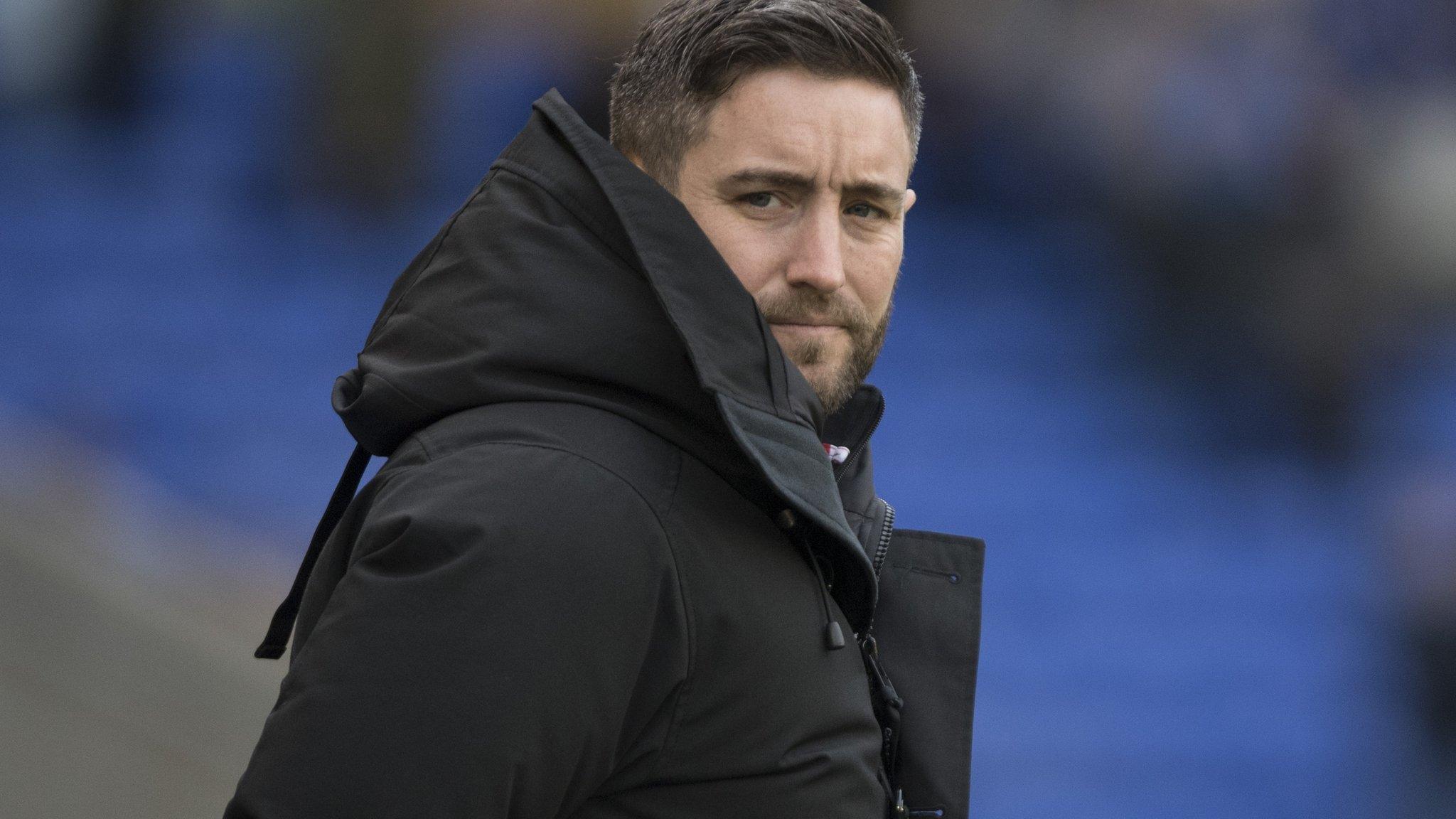Ashton Gate Eight: How eight players tore up their contracts to save Bristol City
- Published
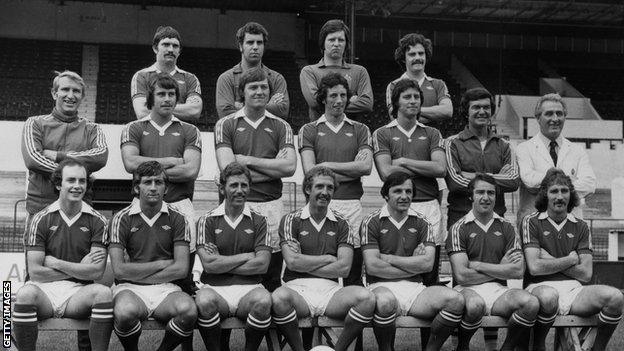
David Rodgers (middle, third from left), Jimmy Mann (front, second from left), Geoff Merrick (front, centre) and Trevor Tainton (front, third from right) pictured as part of Bristol City's 1976-77 squad, when the club played in the top flight for the first time since 1911
"I had a family, three kids, a mortgage. I think I lost about a stone in weight, it was devastating. None of us wanted to leave - but everybody wanted Bristol City to remain."
Thirty-five years on, former captain Geoff Merrick remembers the day he and seven team-mates came together to save the football club they all supported from bankruptcy.
The octet - including Gerry Sweeney, Dave Rodgers, Peter Aitken, Chris Garland, Trevor Tainton, Jimmy Mann and Julian Marshall - have since gone down in City folklore as the 'Ashton Gate Eight', hailed locally as heroes.
But the tale from behind the scenes is a far less fantastical one - threats to the players and their families, mounting pressure from the local press and the impending possibility of financial collapse.
BBC Sport retells the story of how eight footballers sacrificed - or were made to sacrifice - their careers for the good of their team.
'Eight names on a tatty bit of notepaper'
When the eight players agreed to cancel their contracts on the morning of 3 February 1982, Bristol City were just minutes away from folding, with the club set to cease trading at midday.
The incident was the nadir of a three-year period which had seen the Robins slump from a 13th-placed finish in the top flight under Alan Dicks to battling for survival in the third tier under future England boss Roy Hodgson.
"It all started on, I think, a Saturday evening," Merrick, now 65, told BBC Sport.
"I'd played at Arsenal in the reserves. I came back to the ground - there'd been a first-team match that day - and Jimmy Mann was one of the players at the ground.
"He was stood in the entrance way waving this little tatty bit of notepaper. One of the directors had kindly handed it to Jim and said 'give this to Geoff when he comes back'.
"On it was a list of eight names and Jim, who was one of those names, said 'we have to meet the board'."
'If you don't do this, the club dies'
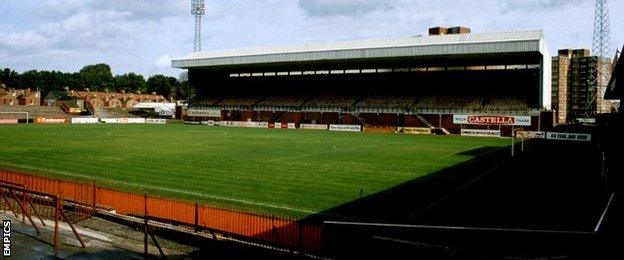
Ashton Gate, pictured in 1978, has been the home of Bristol City since 1904
More than a week of negotiations with the board, the Football Association and the Professional Footballers' Association was to follow.
However, in the words of Match of the Day commentator Jonathan Pearce, who worked for BBC Radio Bristol in 1982, the players had "absolutely no choice" but to surrender their contracts.
"If you don't do this, the club dies, the fans will suffer and the other younger players will suffer - and it's your responsibility to save them," recalls Pearce.
"Jump out of the lifeboat and give your place to someone else so you can save them. There was absolutely no regard to their families and what they were going through in life.
"These weren't players who were on £50,000 or £100,000 per week, these were players who had mortgages to pay and would have to keep working for the rest of their lives."
Much of the blame for City's financial problems has been placed on the decision to sign key players to 10-year deals, but Pearce says "that wasn't the only reason - the club had in many ways lived beyond its means and these players bore the brunt of it".
'A lot of nasty things went on, families were threatened'
Merrick, who had been with the club for "17 or 18 years", remembers the abuse he and others received in the week leading up to their contracts being cancelled.
"The press came and took pictures of our houses, they sort of portrayed us as being very wealthy and the reason Bristol City were going under," he explained. "But the last contract was the best contract I had ever signed. We weren't earning a fortune whatsoever.
"But we didn't want Bristol City to go out of business. We were all ardent City fans. We were kids who had grown up and spent all our life at Bristol City so, obviously, we sort of went along with it."
Former midfielder Tainton continued: "A lot of nasty things went on behind the scenes, families were threatened and everything else, and it was quite a sad, rough time for us all.
"It wasn't my family, I've got to say, but it went on because some other people were thinking in terms of their own side of things.
"They could see that if we didn't do what was suggested that a lot of other people would suffer as well."
'It pushed me into bankruptcy'
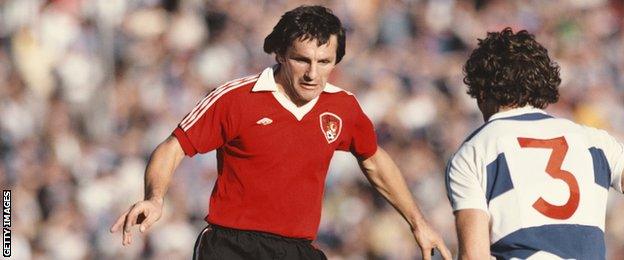
Trevor Tainton made almost 500 appearances as a midfielder for Bristol City
Despite earning "reasonably good money" while on the books at City, Tainton's departure from the club had a huge impact on his life.
"We had a business at the time which we were running, me and my then wife, and that wasn't going very well and I suffered bankruptcy as a result of all this," he said.
"I tried to plan my future looking at my contract and what I had coming in, and the business was a separate item.
"But put the two together with the business not doing very well and that pushed me into bankruptcy.
"I had two young kids and it was not a nice thing to accept - but life goes on."
Like Tainton, Merrick would never play for a Football League club again, finishing his career with Gloucester City in 1983, despite having played over 350 games at the heart of the Robins defence.
"To be told that I was going to be unemployed," he says, "it was life-changing."
The PFA response
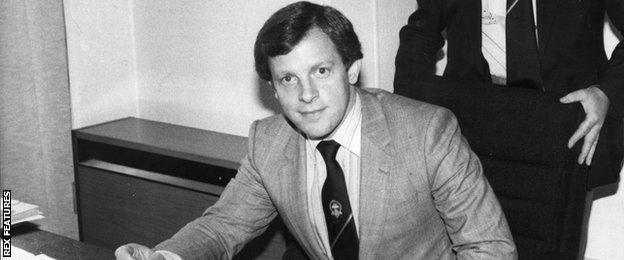
Gordon Taylor has been chairman of the PFA since taking over from Cliff Lloyd in November 1981
At the time of City's troubles, PFA chairman Gordon Taylor was less than a year into his job.
"It was the first time I'd dealt with a club having problems severe enough to put them into liquidation or administration," he told BBC Sport.
"So it was a real testing time, I sort of lived at Bristol for quite a few weeks."
The Ashton Gate Eight incident led to the introduction of the Football Creditors' Act, which means players and other clubs are paid before external creditors when a team goes into administration.
"There was nothing in place to say you couldn't do it, which was why they did it," said Merrick.
"We had meetings with Gordon Taylor and the management committee, but they hadn't come across this.
"This was the first time it had ever happened so they were totally confused. They didn't help us in any way."
But Taylor said that statement is "far from the truth to say the least", as the PFA had experience of a similar situation from March 1962, when Accrington Stanley went bankrupt.
"We were far from confused and understood exactly what the club wished to do and needed to do if it was to be saved."
Taylor also said that the players were compensated, and "nothing was forced" on them: "An amount of approximately £100,000 was achieved by the 'Ashton Gate Eight' with a guaranteed sum of £58,000 added to by monies of over £20,000 from the sale of the ground and further monies from a testimonial match.
"The 'Ashton Gate Eight' would have received more money if the PFA had not been so successful in fixing them up with other clubs."
He added: "We couldn't establish a precedent that they would just go out of the door with nothing at all."
"At the end, nothing was forced on the players.
"They were in a position and were prepared to accept it for the sake of the club and the others players and took that sacrifice."
'Eight saviours of the club'
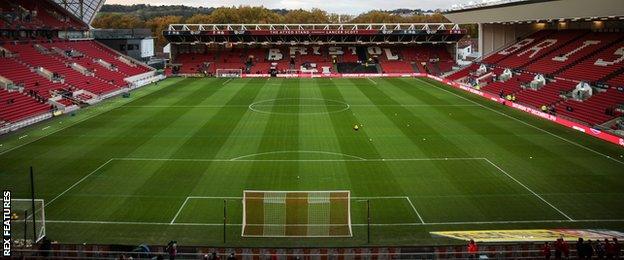
Ashton Gate is now a 27,000-seater stadium, with the newly rebuilt West Stand opened for their opening game this season
Two years later, the Robins were promoted back to the Third Division, and 35 years on they are in the Championship, with a billionaire owner and a newly rebuilt ground.
And the legacy of those "eight saviours of the club", as Taylor describes them, is now marked by a plaque outside of the stadium funded by the Bristol City Supporters Club and Trust.
"The pain in those players' eyes when I sat there and had to record them on my little Uher tape-to-tape machine was something that will haunt me for ever," said Pearce.
"Always at the back of my mind in football when we get to this time of year is the way that friends of mine were treated, the Ashton Gate Eight. They saved the club.
"They were heroes and they haven't been treated like heroes. In many cases they've almost been treated like villains, and it's shameful.
"Football is keen to recognise heroes of the past. Why aren't these players being recognised as the heroes they were?"
Additional reporting by BBC Sport's Tom Garry
- Published2 February 2017

- Published1 February 2017

- Published31 January 2017
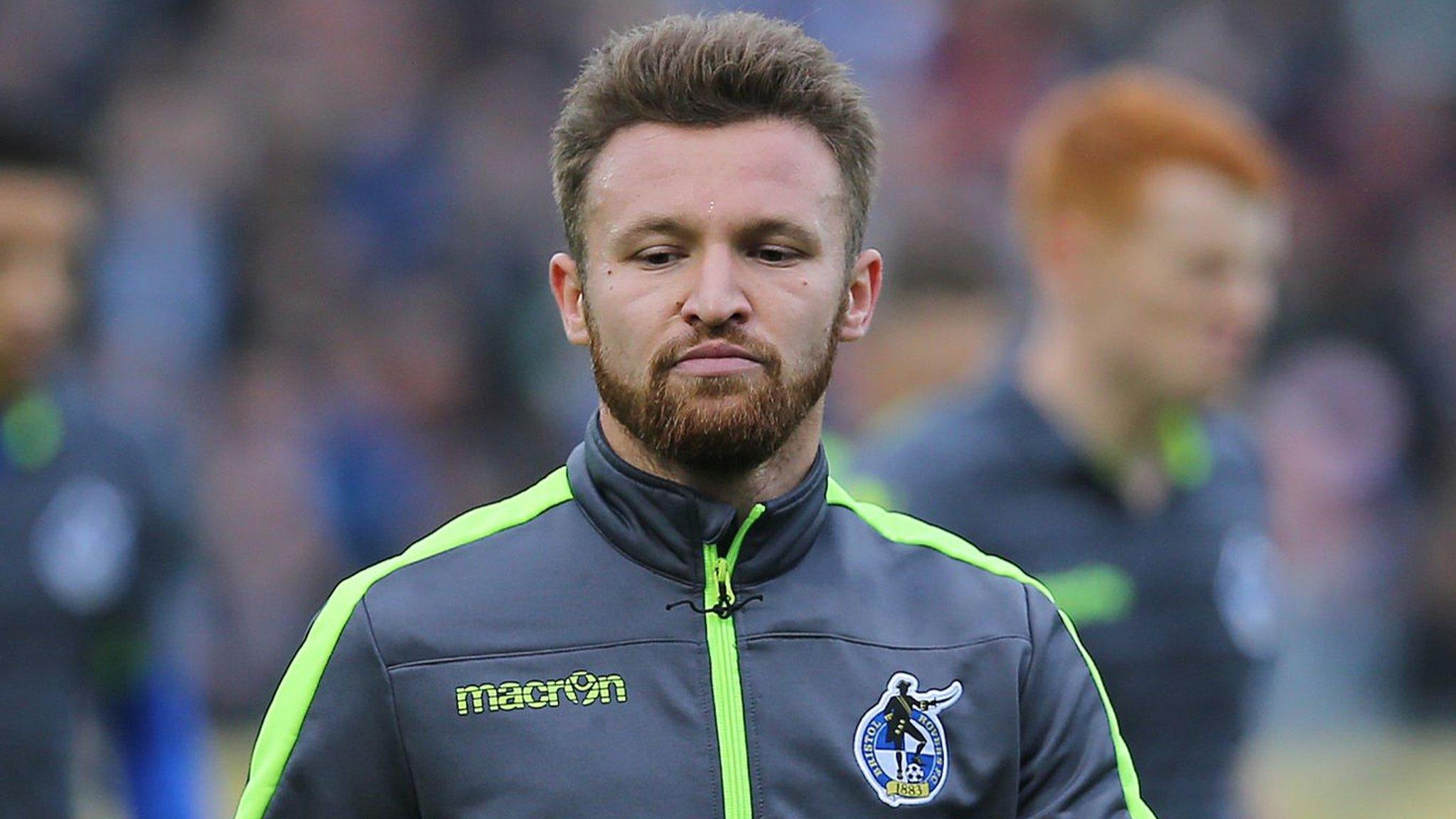
- Published23 January 2017
